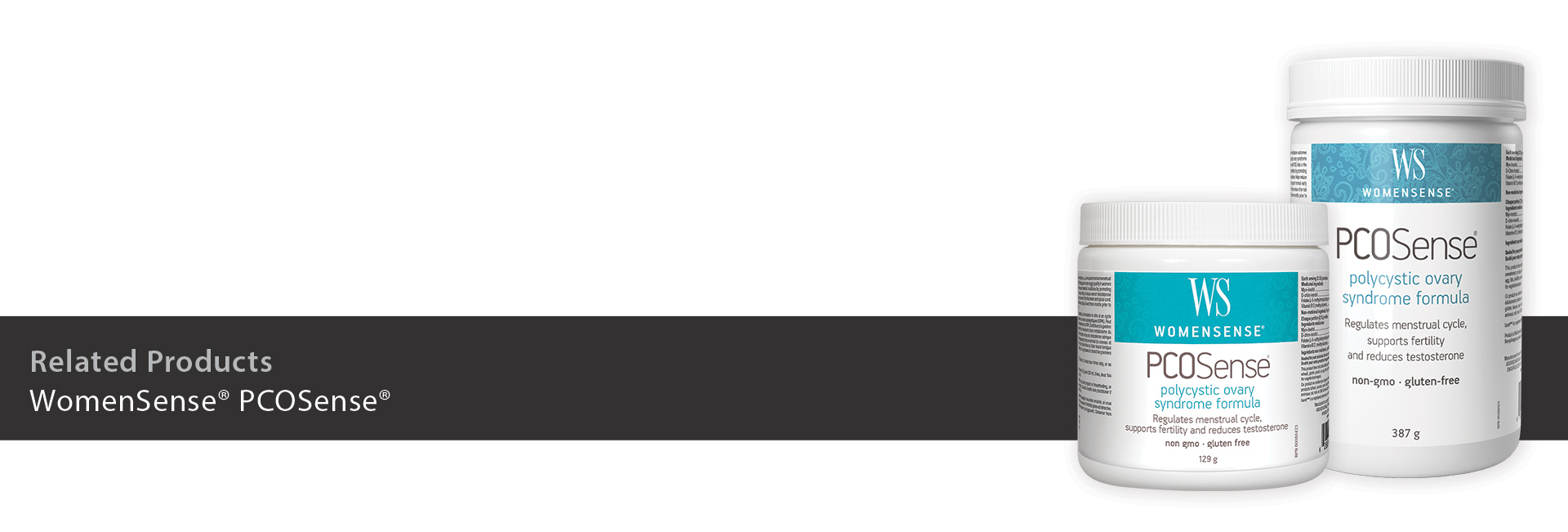Polycystic ovarian syndrome, also known as PCOS, is a common hormonal disorder that affects up to 15% of women of reproductive age. [1,2] First described in 1935 by American gynecologists Irving Freiler Stein and Michael Leventhal, PCOS can begin shortly after puberty, during late adolescence, or in adulthood. Despite its prevalence, women can often wait many months or years before being diagnosed. In one study, about one-third of women surveyed reported it took more than two years to receive a PCOS diagnosis, and almost half visited three or more health professionals before being properly diagnosed. [3]
PCOS affects everyone differently. However, this complex condition may be diagnosed when two of the three following criteria (known as the Rotterdam criteria) exist: [4]
- Ovarian dysfunction (oligo-ovulation or anovulation)
- High androgen levels
- Polycystic ovaries, as seen on ultrasound
Women with PCOS deal with various reproductive, metabolic, cardiovascular, and psychological concerns, including: [1,4,5]
- Irregular menstrual cycles
- Lack of or delayed ovulation
- Hirsutism (facial hair growth)
- Acne
- Hair loss
- Ovarian cysts
- Weight gain and difficulty losing weight
- Infertility
- Mood changes (anxiety, depression)
- Menstrual and pelvic pain
- Sleep apnea
- Cardiovascular risks (dyslipidemia, hypertension)
- Chronic inflammation
Although PCOS was originally thought to be caused entirely by an excess production of androgens (male hormones such as testosterone), research has pointed to other causes of PCOS development, such as genetics and environmental factors. [1,6] Interestingly, increasing occurrences of PCOS worldwide are thought to result from poor diet quality, reduced physical activity, exposure to environmental endocrine-disrupting chemicals (such as pesticides, bisphenol A, and phthalates), altered light exposures, sleep disturbances, and increased levels of stress. [6,7]
Current evidence also highlights the significant impact of high insulin levels and insulin resistance in PCOS. [1] In fact, it’s estimated that approximately 80% of obese women with PCOS, and 30–40% of lean women, have insulin resistance and compensatory hyperinsulinemia. [8] This can negatively impact androgen levels and ovarian health and increase the risk of women developing diabetes, dyslipidemia, and obesity. [1,4,9] Therefore, treatments proven to improve insulin sensitivity have been investigated in supporting individuals with PCOS. Metformin, thiazolidinediones, inositol, and berberine are examples of oral insulin-sensitizing agents that have been shown to improve the endocrine, metabolic, and reproductive abnormalities seen in PCOS. [10]
In the last decade, growing research has unravelled the effectiveness of inositol in improving the outcomes of individuals with PCOS. Myo-inositol (MI) and D-chiro-inositol (DCI) are the two most common isomers of inositol, and multiple clinical trials support MI and DCI supplementation to help reduce insulin resistance, support glucose metabolism, decrease serum androgen levels, and regulate menstrual cycles and ovulation. [11–17]
Although both MI and DCI are beneficial, an MI to DCI ratio imbalance can adversely impact health outcomes in PCOS. Specifically, excess DCI levels can increase androgen production, while decreased MI levels can influence ovarian health. [18] However, supplementation with a combination of MI and DCI in a 40:1 ratio, the same ratio found in the plasma of healthy women, has shown significant clinical results in women with PCOS. [16–20]
In a six-month, randomized, placebo-controlled trial following 46 women with PCOS and a BMI of >30, the participants were assigned to either the treatment group with 40:1 MI and DCI, or to a placebo. [11] Compared to the placebo group, the women in the treatment group experienced significant improvements in both endocrine and metabolic parameters, with decreases in free testosterone, luteinizing hormone (LH), fasting glucose, fasting insulin, and HOMA index, while the placebo group did not experience statistically significant endocrine or metabolic improvements. In addition, a clinical study supplementing 1.1 g of MI with 27.6 mg of DCI daily helped improve oocyte (egg) and embryo quality, as well as pregnancy rates in women with PCOS undergoing IVF. [19]
PCOSense® from WomenSense® is a complete natural health solution for women with PCOS. It is one of the first formulas to combine MI and DCI at the ideal 40:1 ratio, alongside folate and vitamin B12. PCOSense is easy to use – simply stir one scoop of the unflavoured powder into water twice daily to help manage the hormonal and metabolic symptoms of PCOS.
Supplementation with PCOSense can:
- Promote healthy glucose metabolism and reduce insulin resistance
- Support ovarian function, egg quality, and fertility in women with PCOS
- Support a normal menstrual cycle and reduce serum testosterone in women with PCOS
- Support in vitro fertilization (IVF) outcomes in women with PCOS
- Support normal early development of the fetal brain and spinal cord
- Reduce the risk of neural tube defects when taken daily at least three months prior to becoming pregnant and during early pregnancy
PCOS is a complex condition that requires a multi-dimensional treatment approach. In addition to the noted benefits of MI and DCI supplementation, support can also be gained from additional approaches such as a low glycemic index diet, increased physical activity, sleep support, reduced exposure to endocrine disruptors, improved gut health, and correction of nutrient deficiencies. [21]
References:
1. Kamenov Z, Gateva A. Inositols in PCOS. Molecules. 2020; 25(23):5566.
2. Khan MJ, Ullah A, Basit S. Genetic basis of polycystic ovary syndrome (PCOS): Current perspectives. Appl Clin Genet. 2019; 12:249-60.
3. Gibson-Helm M, Teede H, Dunaif A, et al. Delayed diagnosis and a lack of information associated with dissatisfaction in women with polycystic ovary syndrome. J Clin Endocrinol Metab. 2017; 102(2):604-12.
4. Islam H, Masud J, Islam YN, et al. An update on polycystic ovary syndrome: A review of the current state of knowledge in diagnosis, genetic etiology, and emerging treatment options. Womens Health (Lond). 2022; 18:17455057221117966.
5. Louwers YV, Laven JSE. Characteristics of polycystic ovary syndrome throughout life. Ther Adv Reprod Health. 2020; 14:2633494120911038.
6. Parker J, O’Brien C, Hawrelak J, et al. Polycystic ovary syndrome: An evolutionary adaptation to lifestyle and the environment. Int J Environ Res Public Health. 2022; 19(3):1336.
7. Zeng LH, Rana S, Hussain L, et al. Polycystic ovary syndrome: A disorder of reproductive age, its pathogenesis, and a discussion on the emerging role of herbal remedies. Front Pharmacol. 2022; 13:874914.
8. Davinelli S, Nicolosi D, Di Cesare C, et al. Targeting metabolic consequences of insulin resistance in polycystic ovary syndrome by D-chiro-inositol and emerging nutraceuticals: A focused review. J Clin Med. 2020; 9(4):987.
9. Ding H, Zhang J, Zhang F, et al. Resistance to the insulin and elevated level of androgen: A major cause of polycystic ovary syndrome. Front Endocrinol (Lausanne). 2021; 12:741764.
10. Zhao H, Xing C, Zhang J, et al. Comparative efficacy of oral insulin sensitizers metformin, thiazolidinediones, inositol, and berberine in improving endocrine and metabolic profiles in women with PCOS: A network meta-analysis. Reprod Health. 2021; 18(1):171.
11. Benelli E, Del Ghianda S, Di Cosmo C, et al. A combined therapy with Myo-inositol and D-chiro-inositol improves endocrine parameters and insulin resistance in PCOS young overweight women. Int J Endocrinol. 2016; 2016:3204083.
12. Costantino D, Minozzi G, Minozzi E, et al. Metabolic and hormonal effects of myo-inositol in women with polycystic ovary syndrome: A double-blind trial. Eur Rev Med Pharmacol Sci. 2009; 13(2):105-10.
13. Genazzani AD, Santagni S, Rattighieri E, et al. Modulatory role of D-chiro-inositol (DCI) on LH and insulin secretion in obese PCOS patients. Gynecol Endocrinol. 2014; 30(6):438-43.
14. Gerli S, Papaleo E, Ferrari A, Di Renzo GC. Randomized, double blind placebo-controlled trial: Effects of myo-inositol on ovarian function and metabolic factors in women with PCOS. Eur Rev Med Pharmacol Sci. 2007; 11(5):347-54.
15. Regidor PA, Schindler AE, Lesoine B, et al. Management of women with PCOS using myo-inositol and folic acid. New clinical data and review of the literature. Horm Mol Biol Clin Investig. 2018; 34(2).
16. Formuso C, Stracquadanio M, Ciotta L. Myo-inositol vs. D-chiro inositol in PCOS treatment. Minerva Ginecol. 2015; 67(4):321-5.
17. Nordio M, Basciani S, Camajani E. The 40:1 myo-inositol/D-chiro-inositol plasma ratio is able to restore ovulation in PCOS patients: comparison with other ratios. Eur Rev Med Pharmacol Sci. 2019; 23(12):5512-21.
18. Unfer V, Dinicola S, Laganà AS, et al. Altered ovarian inositol ratios may account for pathological steroidogenesis in PCOS. Int J Mol Sci. 2020; 21(19):7157.
19. Colazingari S, Treglia M, Najjar R, et al. The combined therapy myo-inositol plus D-chiro-inositol, rather than D-chiro-inositol, is able to improve IVF outcomes: Results from a randomized controlled trial. Arch Gynecol Obstet. 2013; 288(6):1405-11.
20.Facchinetti F, Unfer V, Dewailly D, et al. Inositols in polycystic ovary syndrome: An overview on the advances. Trends Endocrinol Metab. 2020; 31(6):435-47.
21. Szczuko M, Kikut J, Szczuko U, et al. Nutrition strategy and lifestyle in polycystic ovary syndrome-narrative review. Nutrients. 2021; 13(7):2452.





